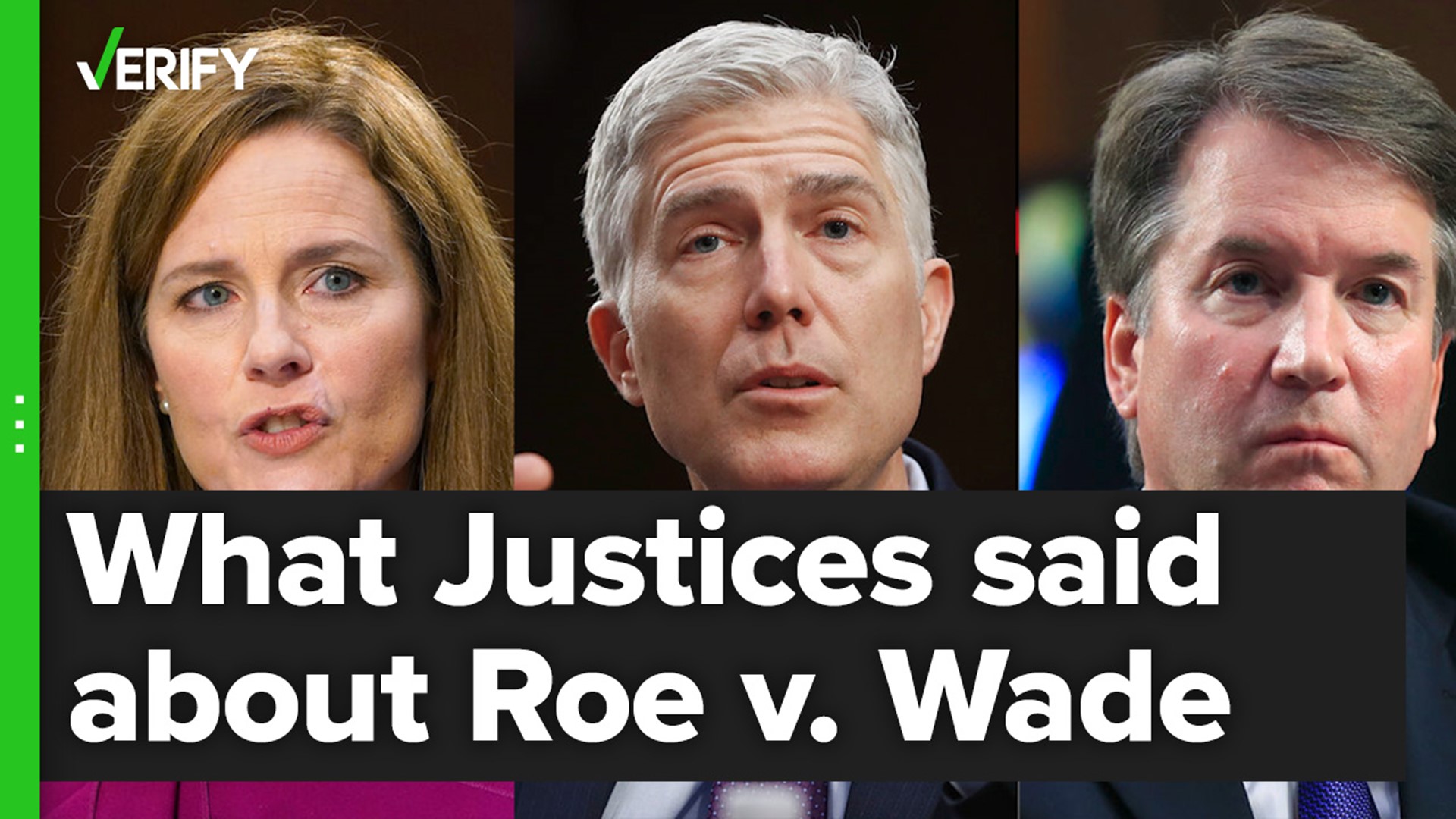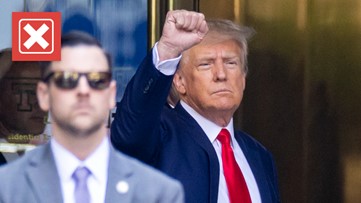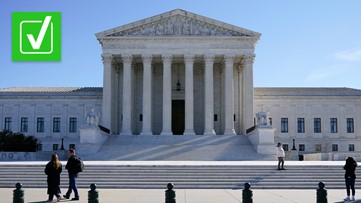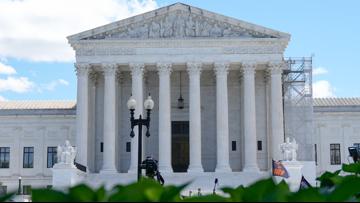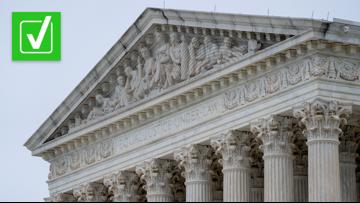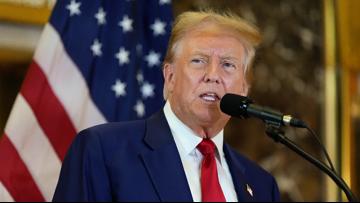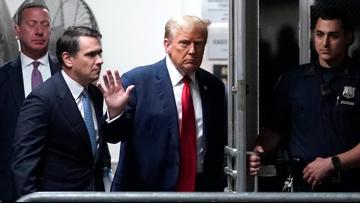Update June 24, 2022: The Supreme Court overturned Roe v. Wade on June 24, ruling in favor of Mississippi's anti-abortion law in Dobbs v. Jackson Women's Health Organization. This story has been updated to reflect the official Supreme Court decision.
On June 24, the U.S. Supreme Court overturned the 1973 Roe v. Wade case that made abortion legal nationwide. There was early speculation the court would overturn the case, especially since a draft majority opinion obtained by POLITICO in May suggested how the judges would decide.
Roe v. Wade had granted the right to abortion under the 14th Amendment for nearly five decades. The Supreme Court’s decision not only overturned Roe v. Wade but also Planned Parenthood v. Casey, a 1992 ruling that upheld the federally protected right to abortion.
After the leaked opinion was released in May, actor George Takei said in a viral tweet that Supreme Court justices lied about their stance on Roe v. Wade during their confirmation hearings.
A VERIFY viewer also texted the team to ask if Supreme Court Justices Amy Coney Barrett, Neil Gorsuch and Brett Kavanaugh said they wouldn’t overturn the landmark court decision. All three justices were nominated by former President Donald Trump and later confirmed by the U.S. Senate.
THE QUESTION
Did Supreme Court Justices Amy Coney Barrett, Neil Gorsuch and Brett Kavanaugh say that they wouldn’t overturn Roe v. Wade during their confirmation hearings?
THE SOURCES
- Confirmation hearing transcript for Amy Coney Barrett
- Confirmation hearing transcript for Neil Gorsuch
- Confirmation hearing transcript for Brett Kavanaugh
- Cornell Law School’s Legal Information Institute
- Hon. John M. Walker, Jr., Senior Circuit Judge, United States Court of Appeals for the Second Circuit
THE ANSWER
No, Supreme Court Justices Amy Coney Barrett, Neil Gorsuch and Brett Kavanaugh didn’t say that they wouldn’t overturn Roe v. Wade during their confirmation hearings.
WHAT WE FOUND
When the draft opinion was leaked, the justices faced criticism from lawmakers. In a statement released on May 3, Sen. Susan Collins (R-Maine) said if the draft opinion is authentic, it would be “completely inconsistent” with what Gorsuch and Kavanaugh said during their confirmation hearings and meetings in her office.
Sen. Lisa Murkowski (R-Alaska) also told reporters at the time that the leaked opinion “rocks her confidence in the court.”
“It was not the direction that I believed that the court would take, based on statements that have been made about Roe being settled, and being precedent,” Murkowski said.
During their confirmation hearings, Supreme Court Justices Neil Gorsuch and Brett Kavanaugh spoke to the importance of Roe v. Wade as a legal precedent that has been reaffirmed over the years. But they didn’t say that they wouldn’t overturn the landmark decision.
Justice Neil Gorsuch
During his confirmation hearing in 2017, Gorsuch called Roe v. Wade a “precedent of the U.S. Supreme Court.”
Cornell Law School’s Legal Information Institute (LII) defines precedent as a court decision “that is considered as authority for deciding subsequent cases involving identical or similar facts, or similar legal issues.”
“It [Roe v. Wade] was reaffirmed in Casey in 1992 and in several other cases. So a good judge will consider it as precedent of the U.S. Supreme Court worthy as treatment of precedent like any other,” Gorsuch said.
Gorsuch later said Casey is “settled law in the sense that it is a decision of the U.S. Supreme Court,” due the weight of precedent “which is quite considerable.”
Precedent is “the anchor of the law” and “the starting point” for a judge, Gorsuch said during his hearing. However, “there are instances when a court may appropriately overrule precedent after considering a lot of factors,” he added.
Gorsuch was also asked if Roe v. Wade had “super precedent.” Gorsuch refused to say the case has “super precedent” and instead said the decision has been “reaffirmed many times.”
Super precedent refers to “those constitutional decisions in which public institutions have heavily invested, repeatedly relied, and consistently supported over a significant period of time,” according to constitutional scholar Michael J. Gerhard.
Justice Brett Kavanaugh
Brett Kavanaugh was asked during his confirmation hearing if he believed Roe v. Wade was a settled precedent and whether it could be overturned.
In his reply, Kavanaugh reaffirmed that Roe v. Wade is “settled as a precedent of the Supreme Court, entitled the respect under principles of stare decisis." He also noted that it has been “reaffirmed many times over the past 45 years,” including in Planned Parenthood v. Casey in 1992.
Stare decisis, which means “to stand by things decided” in Latin, is the “doctrine that courts will adhere to precedent in making their decisions,” according to LII.
While Gorsuch and Kavanaugh said Roe v. Wade is precedent, that doesn’t mean the decision can’t be overturned. Hon. John M. Walker, Jr., Senior Circuit Judge, United States Court of Appeals for the Second Circuit, wrote in a 2016 commentary for Stanford Law School that the Supreme Court may overturn its own precedent and cited several examples of when the court has done so in the past.
Kavanaugh also said during his confirmation hearings that he listens to “all arguments” when deciding a case.
“Precedent is critically important. It is the foundation of our system. But you listen to all arguments,” he said.
Justice Amy Coney Barrett
During Barrett’s confirmation hearing, senators repeatedly asked her about Roe v. Wade. She declined to discuss how she might rule on a case that hadn’t yet been brought before the court, while also acknowledging Roe v. Wade’s precedent.
Barrett said she wouldn’t “pre-commit to approaching a case any particular way,” adding later that Roe v. Wade “clearly held that the constitution protected a woman’s right to terminate a pregnancy.”
“What I will commit is that I will obey all the rules of stare decisis, that if a question comes up before me about whether Casey or any other case should be overruled, that I will follow the law of stare decisis, applying it as the court is articulating it, applying all the factors, reliance, workability, being undermined by later facts in law, just all the standard factors,” Barrett said during the hearing. “I promise to do that for any issue that comes up, abortion or anything else. I'll follow the law."
Barrett was also asked whether Roe v. Wade is “super precedent.” She defined this as “cases that are so well settled that no political actors and no people seriously push for their overruling.”
“And I’m answering a lot of questions about Roe, which I think indicates that Roe doesn’t fall in that category. And scholars across the spectrum say that doesn’t mean that Roe should be overruled, but descriptively, it does mean that it’s not a case that everyone has accepted and doesn’t call for its overruling,” Barrett said.
